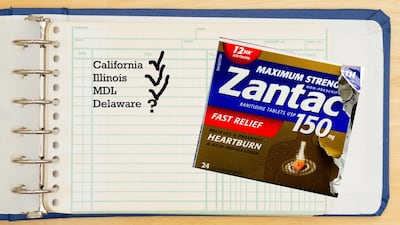ADVERTISEMENT
Safety

Decentralized manufacturing methods for cell and gene therapies will be critical for improving patient access to treatments, but sponsors must prepare to demonstrate “comparability” with centralized manufacturing.

Requests for “enforcement actions are not within the scope of FDA’s citizen petition procedures,” CDER says, rejecting petition dosing device firm Parenteral Technologies submitted as it prepares for workshop on Pediatric Research Equity Act requirements for OTC NDA sponsors.

UK pharma also reaches agreement in principle, subject to DoJ approval, to pay $70m to resolve a whistleblower complaint filed by Valisure, the testing lab which in 2019 raised concerns about a potential link between the use of drugs containing ranitidine, a histamine-2 blocker, and cancer.

NDAs for additional OTC products containing acetaminophen and/or NSAIDs and indicated for use by children between 2 and less than 12 years old would trigger compliance by application sponsors with the act passed in 2003 to address lack of pediatric use information in drug labeling.

The FDA has placed zetomipzomib on clinical hold a year after Kezar decided to focus solely on the product.

This week, Establishment Labs Holdings announced the FDA gave it premarket approval for Motiva breast implant, Cologuard lands FDA approval for Cologuard Plus and GE HealthCare gets FDA nod for a new imaging agent. The FDA announces another expansion for TAP into ophthalmology and radiology. The AAMI and CTA will join forces to develop standards for AI and ML-enabled health care products.

Philips has issued a recall of various Trilogy ventilators due to safety issues that may affect their ability to properly function. The US FDA has designated the recall class I, its most serious.

Provision in Wyden and Merkley’s “Cannabinoid Safety and Regulation Act” referencing FDA authority outside hemp-derived ingredients could provide agency with needed authority to force from the market products labeled as supplements but containing drugs or eliminate the use of many safe ingredients in supplements.

The regulatory, industrial and methodological changes applied to the medtech sector since the introduction of the US Food and Drug Administration’s design control guidance in 1997 are many and varied. Dr. Stuart Grant of Archetype MedTech looks at the challenges these changes present to both innovators and regulators and how the industry needs to adapt.

Streamlined process for reporting problems is key piece of “unified Human Foods Program” which officially launched on 1 October, as Commissioner Robert Califf says, “a new model for field operations and other modernization efforts.”